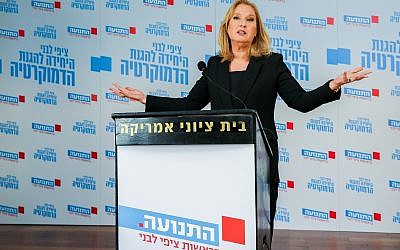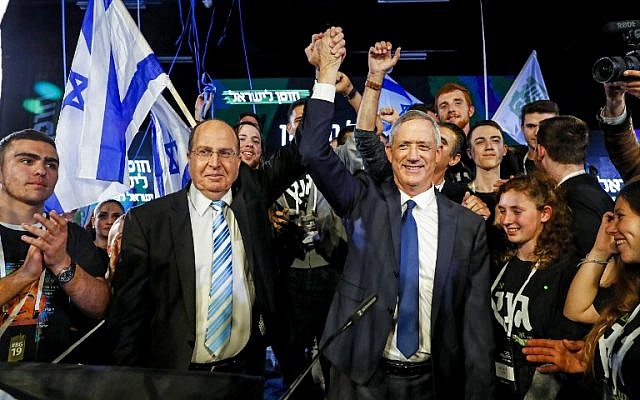Ya’alon plugs ‘right to settle every part of the Land of Israel’
Days after joining political forces with Israel Resilience chair Benny Gantz, former defense minister Moshe Ya’alon outlined on Sunday his ideological opposition to a two-state solution to the Israel-Palestinian conflict, praising the settlement project in the West Bank and saying that the Jewish state “has a right to every part of the Land of Israel.” Following a parlor meeting held by the Telem party chairman in the West Bank settlement of Leshem, Ya’alon said in a video posted to social media that as both IDF commander of the Central Region and as defense minister he had been instrumental in the community’s establishment and was “delighted to see its expansion and growth.”
Looking out from the settlement located some 40 kilometers northwest of Jerusalem and 10 kilometers east of the security fence, Ya’alon said, “When you look westward and see the lights of the Tel Aviv region you can understand the strategic security importance of the settlement here in particular and of the settlements in Judea and Samaria in general, beyond exercising our right to settle every part of the Land of Israel.”
While Leshem is considered an independent settlement, it is officially demarcated as a neighborhood of the Alei Zahav settlement and falls within its municipal boundaries. Founded in 2013, it is now home to around 130 families and 900 residents.
“I came to meet the people, to hear and be heard and to especially to congratulate them for being pioneers in this region,” Ya’alon added.
But not all were happy with the former defense minister’s presence. The parlor meeting was interrupted by Samaria Settlers’ Committee Chairman Tzachi Dickstein, who branded Ya’alon a “political opportunist.”
 “You have become the new Tzipi Livni of politics,” said Dickstein in a knock at the Hatnua leader who has left several parties throughout her political career.
“You have become the new Tzipi Livni of politics,” said Dickstein in a knock at the Hatnua leader who has left several parties throughout her political career.
“You saw that you were not going to pass the electoral threshold, so you joined with Gantz. Whoever says he’s neither left nor right, is left,” the settler leader added, borrowing a talking point used by Likud lawmakers to describe the Israel Resilience party chairman.
Last week, Ya’alon ruled out supporting a two-state solution to the Israeli-Palestinian conflict moments after his new political partner Gantz said he would push for peace if elected prime minister.
Asked by The Times of Israel if he would support a peace deal based on the premise of two states for two peoples, Ya’alon replied, “Of course not.”
 Ya’alon, a former member of the right-wing Likud party, has long held hawkish views toward the Palestinians and, as Israel Defense Forces chief of staff, he opposed the 2005 Israeli disengagement from the Gaza Strip.
Ya’alon, a former member of the right-wing Likud party, has long held hawkish views toward the Palestinians and, as Israel Defense Forces chief of staff, he opposed the 2005 Israeli disengagement from the Gaza Strip.
The two made the announcement during a rally for Israel Resilience in Tel Aviv, where Gantz officially kicked off his election campaign with his first political speech.
Though he did not endorse a two-state solution, Gantz stressed in his speech that he would try to reach an agreement with the Palestinians.
“I know that we need something different, we can have something different. A government I lead will seek peace and won’t miss an opportunity for a regional change,” he said.
But if such an opportunity does not appear, Gantz said, “we will create a new reality.”
“We will fortify Israel’s position as a democratic state, strengthen the settlement blocs and Golan [Heights], where we won’t ever leave. The Jordan Valley will be our border, but we won’t let millions of Palestinians living beyond the fence endanger our identity as a Jewish state,” he said, seemingly ruling out a one-state formula.
Looking out from the settlement located some 40 kilometers northwest of Jerusalem and 10 kilometers east of the security fence, Ya’alon said, “When you look westward and see the lights of the Tel Aviv region you can understand the strategic security importance of the settlement here in particular and of the settlements in Judea and Samaria in general, beyond exercising our right to settle every part of the Land of Israel.”
While Leshem is considered an independent settlement, it is officially demarcated as a neighborhood of the Alei Zahav settlement and falls within its municipal boundaries. Founded in 2013, it is now home to around 130 families and 900 residents.
“I came to meet the people, to hear and be heard and to especially to congratulate them for being pioneers in this region,” Ya’alon added.
But not all were happy with the former defense minister’s presence. The parlor meeting was interrupted by Samaria Settlers’ Committee Chairman Tzachi Dickstein, who branded Ya’alon a “political opportunist.”

Head of Hatnua party Tzipi Livni speaks at a campaign event on January 29, 2019. (Flash90)
“You saw that you were not going to pass the electoral threshold, so you joined with Gantz. Whoever says he’s neither left nor right, is left,” the settler leader added, borrowing a talking point used by Likud lawmakers to describe the Israel Resilience party chairman.
Last week, Ya’alon ruled out supporting a two-state solution to the Israeli-Palestinian conflict moments after his new political partner Gantz said he would push for peace if elected prime minister.
Asked by The Times of Israel if he would support a peace deal based on the premise of two states for two peoples, Ya’alon replied, “Of course not.”

Former Israeli chiefs of staff Benny Gantz (C-R) and Moshe Ya’alon (C-L) at rally in Tel Aviv on January 29, 2019. (Jack Guez/AFP)ya’
In 2014, he was quoted as criticizing then-US secretary of state John Kerry as “obsessive” and “messianic” for his efforts to broker a peace agreement between Israel and the Palestinians. He later apologized.
Ya’alon last month formed the Telem Party, which on Tuesday officially teamed up with Gantz’s Israel Resilience to run on a joint electoral slate in Knesset elections on April 9.The two made the announcement during a rally for Israel Resilience in Tel Aviv, where Gantz officially kicked off his election campaign with his first political speech.
Though he did not endorse a two-state solution, Gantz stressed in his speech that he would try to reach an agreement with the Palestinians.
“I know that we need something different, we can have something different. A government I lead will seek peace and won’t miss an opportunity for a regional change,” he said.
But if such an opportunity does not appear, Gantz said, “we will create a new reality.”
“We will fortify Israel’s position as a democratic state, strengthen the settlement blocs and Golan [Heights], where we won’t ever leave. The Jordan Valley will be our border, but we won’t let millions of Palestinians living beyond the fence endanger our identity as a Jewish state,” he said, seemingly ruling out a one-state formula.
Comments
Post a Comment